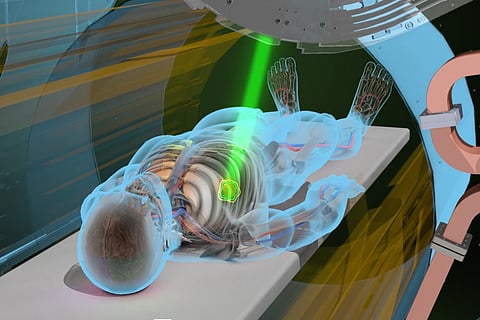Modern radiotherapy is revolutionising cancer treatment in India
Bhuvana, a 38-year-old woman residing in Chennai, was leading a fulfilling life until her world was suddenly turned upside down by a cancer diagnosis. Initially experiencing symptoms of vague discomfort in chest region & vaguely palpable left breast lump, Bhuvana sought medical attention, leading to a series of diagnostic tests that revealed a malignant tumour in her breast. The news sent shockwaves through Bhuvana and her family, propelling them into an uncertain and daunting journey.
“In the realm of cancer treatment, we confront the disease with three fundamental modalities: surgery, radiation, and chemotherapy. Each plays a vital role in our arsenal against cancer. Think of it as a strategic battle — the surgeon removes the tumour, the radiation oncologist targets residual cancer cells, and chemotherapy combats systemic spread,” says Dr Shankar Vangipuram, a seasoned radiation oncologist with Apollo Cancer Centre, who spearheaded Bhuvana's treatment plan, which incorporated the latest advancements in radiotherapy. Considering the size and location of the tumour, a plan was chalked out to ensure comprehensive treatment and maximise the chances of a favourable outcome.
Current state of radiotherapy
Radiation therapy, is a treatment modality based on the use of high energy rays or radioactive substances, to damage tumoral cells and to halt their growth and division.
Dr Vangipuram explicates the foundational principles of radiotherapy, emphasising the crucial parameters of accuracy and precision. In the evolution of radiotherapy technology over the past decades, advancements have led to a paradigm shift in accuracy and precision with improvements happening along the course from 2D-3D-High precision RT – Radiosurgery because of biomedical revolution enabled by medical physics and enigneers.
Significant advancements and impact
The integration of advanced technologies like CyberKnife and proton therapy in Chennai has revolutionised cancer treatment, offering unparalleled precision and efficacy. Dr Vangipuram underscores the benefits of abbreviated treatment regimens, such as Radiosurgery, particularly for patients with oligometastatic disease (an intermediate stage of cancer between localised and widely spread disease), highlighting improved outcomes, reduced complications, and logistical convenience.
Role of AI and machine learning
“Artificial intelligence (AI) and machine learning algorithms are reshaping the landscape of radiotherapy planning and delivery,” Dr Vangipuram notes. He elucidates the multifaceted role of AI, from early diagnosis to treatment planning optimization and complication prediction. “These AI-driven innovations not only enhance treatment efficacy but also streamline clinical workflows, ultimately benefiting patient care.”
Future of robotics in radiotherapy
“The convergence of robotics and radiotherapy holds immense promise for the future of cancer treatment,” states Dr Vangipuram. He delineates the distinctions between robotics in surgery and radiation oncology, emphasising the pivotal role of robotic platforms like CyberKnife in delivering precise and targeted radiation doses. Robotics, coupled with advanced imaging techniques, herald a new era of personalised cancer therapy.
Patient-specific treatment plans
“In the era of high precision radiotherapy, patient-specific treatment plans are paramount to ensuring optimal outcomes,” Dr Vangipuram asserts. He elucidates the concept of hypofractionation, wherein abbreviated treatment schedules deliver higher radiation doses with meticulous precision. “These tailored treatment plans undergo rigorous quality assurance protocols to uphold patient safety and efficacy.”
Addressing previously hard-to-treat cancers
“Recent advancements in radiotherapy have expanded treatment options for previously hard-to-treat cancers,” observes Dr Vangipuram. He underscores the efficacy of radiosurgery in managing benign intracranial tumours (non-cancerous brain tumours) and extracranial malignancies (cancerous tumours that grow outside the brain), citing examples such as lung, liver, and prostate cancers. “Innovative technologies like CyberKnife and proton therapy offer hope for patients with complex and recurrent diseases.”
Patient demographics and treatment trends
Reflecting on the evolving patient demographics and treatment trends in cancer care, Dr Vangipuram notes, “While urban centres like Chennai witness a surge in well-informed patients seeking advanced radiotherapy options, rural areas grapple with a different spectrum of cancers, often associated with socio-economic factors.” He emphasises the importance of holistic patient care, informed decision-making, and multidisciplinary collaboration.
Challenges and solutions
“Despite remarkable advancements, oncologists face challenges in implementing cutting-edge radiotherapy techniques,” acknowledges Dr Vangipuram. He delineates the need for specialised training, infrastructure, and quality assurance measures to ensure safe and effective treatment delivery. “Hospitals in Chennai are overcoming these challenges through continuous education, collaboration with international experts, and investment in state-of-the-art technologies.”
Ensuring patient safety
“In the pursuit of excellence in radiotherapy, patient safety remains paramount,” underscores Dr Vangipuram. He emphasises the importance of robust quality assurance protocols, meticulous treatment planning, and adherence to best practices. “While modern radiotherapy offers unprecedented precision and efficacy, ongoing vigilance and adherence to stringent safety standards are imperative.”
Future research directions
Looking ahead, Dr Vangipuram envisions a future where radiotherapy intersects with immunotherapy and targeted therapies, unlocking new frontiers in cancer treatment. “The integration of AI, robotics, and precision medicine heralds a transformative era in personalised oncology care,” he remarks. Continued research and innovation will drive advancements in radiotherapy, empowering clinicians to combat cancer with unparalleled precision and efficacy.
As the sun sets over the bustling streets of Chennai, the narrative of Bhuvana and countless others serves as a testament to the transformative power of modern radiotherapy. With unwavering dedication, pioneering oncologists like Dr Vangipuram are reshaping the landscape of cancer care, ushering in a new era of hope, precision, and resilience in the fight against cancer.
Dr Shankar Vangipuram
Senior Consultant - Radiation Oncology
Apollo Cancer Centre, Chennai

